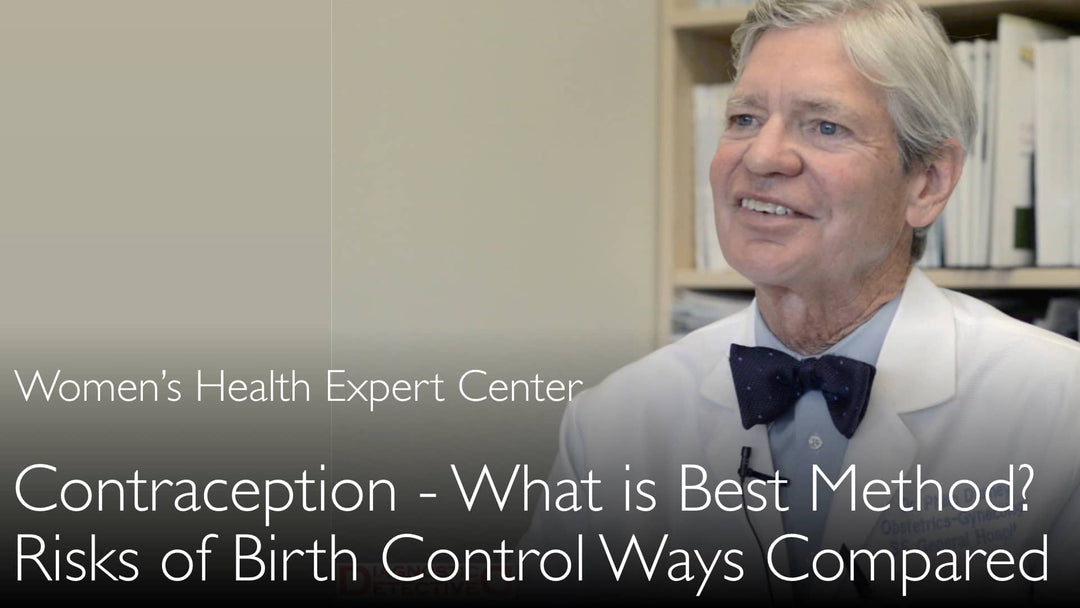Choosing the right birth control method is crucial for effective family planning and reproductive health. While birth control pills remain popular, long-acting methods like contraceptive implants and intrauterine devices (IUDs) offer superior efficacy and safety. These methods are not only cost-effective but also reversible, allowing women to plan pregnancies when desired. Experts like Professor Darney emphasize the importance of these options in reducing unintended pregnancies and supporting maternal and infant health.
De bästa preventivmedlen är inte p-piller. Men "p-piller" är fortfarande den mest populära preventivmetoden. Ledande expert på reproduktionsmedicin från Kalifornien berättar om de mest effektiva, säkra och kostnadseffektiva preventivmetoderna på 2000-talet.
De bästa preventivmetoderna är intrauterina enheter och hormonella implantat. De är säkra och mest effektiva preventivmetoder. Hormonella implantat är de bästa preventivmetoderna eftersom de är mycket billiga och långtidsanvända. Hormonella implantat och intrauterina enheter är helt reversibla. En kvinna kan bli gravid efter att ha avlägsnat en intrauterin anordning. Graviditeten inleds efter att ett hormonellt implantat har avlägsnats. Bästa preventivmetoder. 1234 Som du nämnde i vår konversation lite tidigare. Den önskade graviditeten är en av de viktigaste indikatorerna för kvinnans hälsa och hälsan för det framtida barnet. Tillgång till säkra och effektiva preventivmedel är därför ett mycket viktigt ämne inom familjeplanering. Orala preventivmedel har kanske varit en av de mest populära preventivmetoderna. Men du har publicerat omfattande artiklar om säkerheten och effektiviteten hos intrauterina enheter och implanterbara preventivmedel. Så vilka är de mest effektiva och säkra metoderna för födelsekontroll (preventivmedel) för en kvinna idag? 1234 (Specialist i obstetrik, gynekologi och reproduktionsvetenskap, UCSF). De överlägset mest effektiva preventivmedlen är de långverkande, högeffektiva preventivmedel som du nämnde. Det är preventivmedelsimplantat och intrauterina preventivmedel. De är mer effektiva än kirurgisk sterilisering. På grund av effektivitet och säkerhet ökar deras popularitet över hela världen. Som ni påpekar har p-piller länge varit den viktigaste metoden för säkra och effektiva preventivmedel, särskilt i USA. Men orala preventivmedel är helt enkelt inte lika effektiva som dessa långverkande metoder. orala preventivmedel innebär för en liten minoritet av de kvinnor som använder dem en risk för venös trombos. (Djup ventrombos) risken med p-piller finns särskilt för kvinnor som redan löper risk för ventrombos. det har varit en särskilt kontroversiell fråga i Västeuropa. Kondom kan vara ett mycket effektivt preventivmedel. Men kondomer kräver en stor ansträngning varje gång av det par som använder dem. Detsamma gäller för alla vaginala preventivmetoder. Det finns alltså verkliga fördelar med dessa långverkande, högeffektiva preventivmedel. Intrauterina anordningar och hormonella implantat. Flera kliniska prövningar har visat på deras fördelar. Implantat förhindrar tonårsgraviditeter. De uppmuntrar till planerade graviditeter. Kom ihåg att över hela världen är 40-50% av graviditeterna oavsiktliga. Detta är också sant i USA. Men det är inte sant i Västeuropa. En del kvinnor som får komplikationer under graviditeten eller dör till följd av graviditeten. Hälften av dem ville inte bli gravida från första början. Dessa kvinnor föds också för tidigt. Detta är den främsta orsaken till neonatal dödlighet. De här kvinnorna ville inte bli gravida från första början. Så att hjälpa dem att planera graviditeter är en avgörande faktor för kvinnors hälsa och spädbarns hälsa. 1234. Intrauterina enheter och hormonella implantat tar förmodligen bort så mycket av den mänskliga faktorn. Man måste komma ihåg att ta ett piller varje dag. Du behöver inte komma ihåg att använda kondom varje dag. Därför ökar den praktiska effekten av intrauterina enheter och preventivmedelsimplantat. 1234 Ja. Om du har ett p-stav, så sitter den där i fem år. Du behöver inte göra någonting. Du är helt skyddad från oavsiktlig graviditet. Intrauterina preventivmedel håller ännu längre än implantaten. De är mycket effektiva på grund av sina verkningsmekanismer. De kräver inte att du kommer ihåg att göra något för att använda dem. Du behöver inte komma ihåg att ta ett piller varje dag. Du behöver inte sätta på en kondom varje gång före samlag. Intrauterina enheter är billiga. Den initiala kostnaden kan vara mycket större. Det är kostnaden när du får det intrauterina preventivmedlet insatt. Men på lång sikt är de mycket billigare än de dagliga preventivmetoderna. 1234. En kvinna bestämmer sig för att ha en planerad graviditet. Är effekterna av intrauterina preventivmedel och hormonella implantat reversibla? Hur säkra är intrauterina preventivmedel för fertiliteten? 1234. Deras verkan är helt reversibel. Det finns inga bevis för att intrauterina preventivmedel leder till bäckeninfektioner. Kvinnan förlorar inte sin fertilitet. Så vi förser gärna tonåringar som vill undvika graviditet med ett intrauterint preventivmedel. Om det är vad hon vill använda. 1234: Professor Darney, tack så mycket för det här fascinerande och mycket viktiga samtalet. Ämnet reproduktiv hälsa och familjeplanering är mycket viktigt för kvinnor och familjer runt om i världen. Jag är mycket tacksam för möjligheten att få tala med er i dag. Tack så mycket! 1234 Det har varit ett nöje. Tack för dina bra frågor. Bästa preventivmetoderna. Hormonella implantat, intrauterina preventivmedel - säkerhet och effekt. Hur väljer man den bästa och säkraste preventivmetoden?






